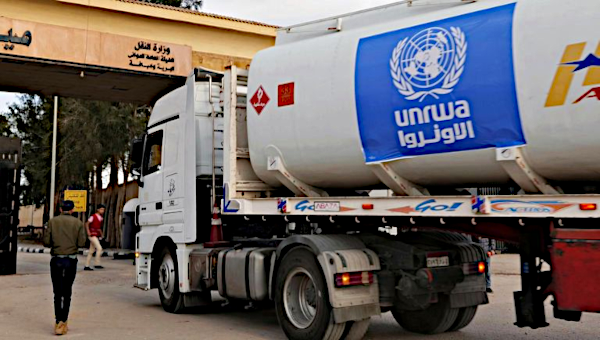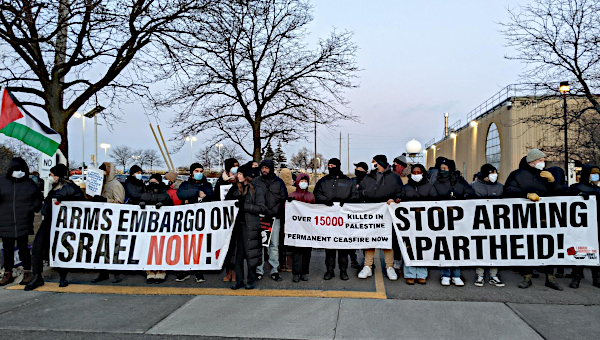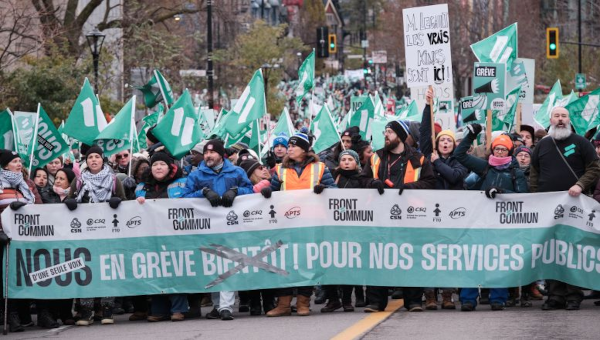Forum in Vancouver Discusses BC Provincial Election
A few days ago, Vancouver Socialist Forum held a public forum on “The BC Election and Movements for Social Change.” The goal of the forum was to inject some discussion and debate into what is an election campaign nearly devoid of solutions to the concerns of working class people. Voters go to the polls on May 12.
Livable Region
Eric Doherty of the Livable Region Coalition in Vancouver was the first speaker. His talk focused on the multi-billion dollar road, port and rail expansion underway in the Vancouver region, known as “Gateway.” The main purpose of the expansion is to allow faster entry and exit of goods from the port of Vancouver. It is also purported to ease growing automobile traffic congestion… by building more roads and bridges! He argued for an urban plan for Vancouver that takes account of the need for massive reductions in greenhouse gas emissions in the economy and necessarily a shift away from auto transport to public transit.
The governing Liberal party of Premier Gordon Campbell and a preceding Liberal government in Ottawa initiated Gateway. The opposition New Democratic Party supports it, albeit with a few complaints about secondary aspects of it. Many party members are active in grassroots coalitions that have sprung up to oppose it.
Living Wage
Next up was Jennifer Whiteside of the Living Wage Campaign of the Hospital Employees Union (HEU), an affiliate of CUPE. She outlined the devastating consequences of the 2004 privatization by the Liberals of the cleaning, food and other service jobs in the province’s hospitals. 8,5000 workers, mostly women, lost their jobs (circa $18 per hour) at that time.
Most of the privatized workers voted at the first opportunity in 2005 and 2006 to rejoin HEU. Shockingly, the woodworkers union (since merged into the Steelworkers) had signed sweetheart collective agreements with the companies awarded the privatization contracts. Workers have clawed their way back to a range of $13 per hour wages, and work conditions remain difficult and perilous. There has been a decline in cleanliness, food service and other conditions in the hospitals. Workers are not given the time nor training to do their jobs at the same standard as the previous workforce, and food services have been contracted out to multinationals that serve unhealthy or inedible product.
Whiteside explained that the Living Wage Campaign is the union’s way of dealing with the very difficult conditions in which it bargains collective agreements. Service workers are considered an “essential service” under the law, so this limits their legal right to picket and otherwise affect hospital operations in case of strike action. The campaign aims to reach into broader society and win what the union says is a livable wage for the Vancouver region, namely $16.74 per hour. It is modelled after similar campaigns in the U.S. and Britain.
She reported that the newly elected, Vision Vancouver Party municipal government in the city of Vancouver has decidedly cooled to its pre-election suggestion of interest in and support of the campaign.
Her talk raises the interesting point of whether strike action in industries declared “essential” remains a necessary tactic in a union’s arsenal. One speaker in the discussion period argued that it did. Even when workers can’t shut down a worksite, picket lines are vital weapons for communicating information and rallying support and solidarity.
What are other unions in the province doing to support this embattled union and these seriously-exploited workers? Not much. In April of 2004, the province was on the verge of a general strike to block the privatization of hospital services. The HEU was on strike and threatened with all kinds of legal and financial penalties. Leaders of the BC Federation of Labour and its affiliates refused to carry through on promises to back the union. They negotiated a late-night agreement with the government that ended the HEU strike and pulled the rug from under a growing momentum toward a general strike.
The agreement conceded the job privatizations as well as many other cuts to health workers jobs and conditions. Workers in several cities actually walked out in support of HEU for one day, including in Victoria and Quesnel. (You can read more on this story on the Socialist Voice website for the year 2004.)
So HEU is still very much in a recovery mode. A Supreme Court of Canada decision in June, 2007 ruled illegal the actions of the government in carrying out the privatization (its Bill 29). But the court limited its penalty to several thousands of dollars of compensation to each of the affected workers. It did not undo the original crime. The Federation of Labour hailed the court decision as a great victory.
The NDP proposes nothing for all those workers who lost their jobs in the hospitals. It says it will not undo their privatization nor any other undertaken by the Liberals (BC Rail, quasi-privatization of BC Ferries, etc.). Nonetheless, the HEU is campaigning strongly for the NDP because it believes this would give the union and workers a better fighting chance. By all evidence, the Liberals will launch new and serious attacks on social services if re-elected.
The NDP is supporting a campaign of the Federation of Labour for a $10 per hour minimum wage. The campaign is at least two years old, and $10 per hour is sounding more and more paltry. The minimum wage has been frozen at $8 for eight years. It is now the lowest in Canada.
Two Denials
Finally, this writer spoke on behalf of Vancouver Socialist Forum. I spoke on the two great denials by the ruling class that dominate politics in this country – one, that the federal government and ruling class are taking firm measures to ease the worst of the economic downturn and pain will be short lived; and two, that the climate emergency is being adequately addressed by current policy.
To the extent there are any issues of significance being discussed in this election, “the environment” can be said to be one of them. But it’s an appearance only. No issues of substance are up for debate. The two largest contributors to increases in greenhouse gas emissions in this province – Gateway, and expansion of oil and gas production in the northeast of the province – are barely discussed in the case of the first, and not at all in the case of the second.
The expansion underway of gas production in northeast BC may rival the tar sands of Alberta for its destruction to the natural environment. That’s because the gas is contained in shale rock and can only be extracted through a version of strip mining and application of heat energy to the rock. This also requires the despoliation of massive amounts of water. Yet, absolutely no one in the province is reporting on it, still less debating it and calling for it to be halted. This includes the Green Party. The Greens do oppose Gateway.
My talk ended with an outline of some of the action proposals to deal with the economic downturn that have been published recently in articles that I have authored or co-authored in Socialist Voice. Any reader who would like to receive an outline of my talk can write to me to receive it. I am sending a copy to Climate and Capitalism because it contains some useful information on gas industry expansion in BC.
Finally, attendance at the forum was poor, some 30 people. This reflects two realities. Our efforts to publicize the forum were weak, and we need to improve this. And, it is difficult to inspire people to attend forums on electoral politics. A vigorous and thoughtful campaign by the labour movement on vital issues in this election, such as the Australian unions’ “Your Rights at Work” campaign in the national election of 2007, would generate debate and large turnouts to public forums. So, too, could a vigorous campaign of socialist candidacies. Neither exists in this election.
The NDP is getting paltry turnouts to its campaign events. At the outset of the election, it announced reactionary, law and order proposals as central to its campaign platform. That’s in reaction to recent rises in criminal violence caused by the laws against illegal drugs. The laws create lucrative markets for drug dealers. The NDP opposes the legalization of the drug trade that is so profitable for criminals, including those on the inside of the police and judicial system.
The Green Party favors the legalization of marijuana and it wants a halt to the police use of tasers that was so dramatically shown to the world in 2007 when Polish visitor to Canada Robert Dziekanski was killed by federal police tasers at the international terminal of the Vancouver airport.
Finally, there will be a referendum for a proportional representation voting procedure on the ballot May 12. Single Transferable Vote (STV) won 57% of the vote in the 2005 election, but the Liberal government had decreed in advance that 60% was required before it would pass the measure into law. We will be hearing more about this progressive ballot measure in the closing weeks of the campaign. The NDP, BC Federation of Labour and the Liberal Party oppose it. •





